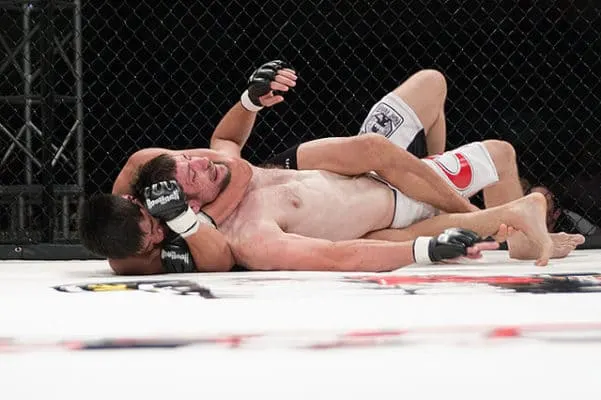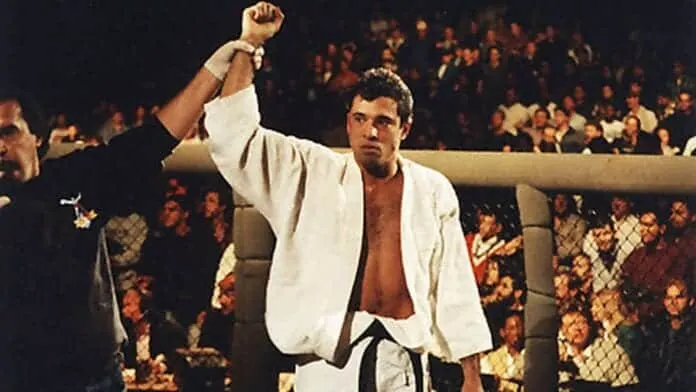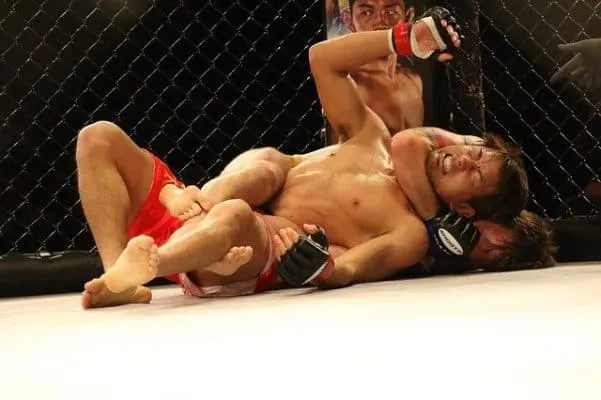
Brazilian Jiu-Jitsu (BJJ) is continuing to rise in popularity, with gyms opening up across the country. It also seems like many of the UFC champions have some form of BJJ training. This raises the question whether this is an essential martial art for MMA fighters. This article will therefore explore the importance of BJJ in MMA.
BJJ is incredibly useful, but not essential, in MMA. It is one of the best martial arts for ground fights, but does not train fighters for clinching and stand-up fights. Other martial art combinations, such as Sambo and Wrestling, teach ground technique as well as clinching and stand-up fighting.
I will explain the reasons behind this in more detail below. This article will also explore which martial art can beat Jiu-Jitsu and why BJJ lessons are so expensive.
How Important is Jiu-Jitsu in MMA?
MMA fighting can be broken down into three key components; stand-up, clinch and ground fighting. Below is the definition of each.
Stand-up Fighting: Hand to hand combat in a standing position. This includes boxing and kickboxing.
Clinch Fighting: Grappling your opponent in a standing position. This includes Wrestling and Judo.
Ground Fighting: Hand to hand combat on the ground, which also involves grappling your opponent. This includes BJJ, Sambo or Collegiate Wrestling.
As you can see, each martial art will focus on one of these components. This is why fighters will often combine techniques they have learnt from different martial art disciplines. In order to succeed in MMA, it is best to learn techniques in all three fighting styles.
In the early years of the UFC, Royce Gracie demonstrated that the techniques of BJJ could help him defeat any martial art. His opponents were unable to defend against his unique style of fighting.

However, over time, Jiu-Jitsu has become more popular within MMA and many fighters have either trained in BJJ or have trained to defend themselves against it. For example, even Conor McGregor, who is known for skill in stand-up fights, is a brown-belt in Jiu-Jitsu. He specializes in Boxing, but is trained in Jiu-Jitsu in case the fight is taken to the ground.
However, BJJ is not the only martial art that prepares a fighter for ground fighting. Khabib Nurmagomedov is a great example of someone who has not trained in Jiu-Jitsu, but is an excellent ground-fighter. He has trained in Sambo, Judo, Pankration, Wrestling and Kickboxing, and he had never lost a fight prior to his retirement in 2020.
For this reason, MMA fighters do not need to know Jiu-Jitsu specifically to succeed, but they do need to have training in all three styles of fighting. Knowing how to fight standing, in clinch and on the ground will prepare them for taking on any opponent or situation.
What Level of BJJ is needed in MMA?
You do not need to have any particular belt in BJJ to compete in MMA. The belt system is also difficult to gauge in MMA because many fighters, such as Demetrius Johnson in his early UFC career, train in No-Gi Jiu-Jitsu.
Because of this, they may have the skills of a higher belt, but are technically still classified a lower belt. For example, Demetrius Johnson was considered a white-belt for years while being able to submit black belts. He was later awarded his brown belt when he began training in Gi-Jiu-Jitsu.
Although you do not need to be a particular belt to participate in MMA, most successful fighters that have trained in Jiu-Jitsu are at least a purple belt.
Can I Do MMA without Training in Jiu-Jitsu?
You can enter the MMA without any prior training in BJJ. However, if you want to succeed in MMA fighting, it would be very wise to train in some form of ground fighting, such as those mentioned above.
Ground fighting techniques include ground control, submissions and striking while on the ground. Instead of BJJ, you could learn these techniques in Judo, Sambo, Combatives, Pankration, etc.
If you have no prior experience in ground fighting and your opponent grapples you to the ground, you will struggle to defend yourself and regain control of the fight.
Is BJJ Still Effective in MMA?
BJJ is an excellent martial art to prepare you for ground fighting and is therefore still effective in MMA. BJJ specialist Charles Oliveira, for example, defeated many of his opponents utilizing his BJJ skills and also has the most submission wins in UFC history. However, as a solitary martial art, BJJ is not as effective today as it was in 1993 when Royce Gracie dominated the UFC.

BJJ fails to prepare students for stand-up fighting where they are expected to strike their opponent. It also does not focus on learning takedowns to get an opponent to the ground where they will have the advantage. In order to learn techniques that are not taught well in BJJ, such as takedowns, most fighters will train in at least one other martial art as well.
In addition to this, fighters these days are aware of the BJJ techniques and, instead of training in Jiu-Jitsu, are training themselves to overcome BJJ positions of control and submissions. For example, fighters are learning how to keep their airways open or keep the pressure off their joints so they have enough time to escape.
Should I Train MMA or BJJ?
If you want to learn about all components of MMA fighting, you should train MMA. But if you want to focus on learning about ground techniques only, then train BJJ.
Keeping in mind that more MMA fighters are adapting their fighting style so they can defend against BJJ techniques, it is a natural assumption that BJJ should be adapted for MMA.
One great example is the use of the cage during an MMA fight. In MMA, the fighters are surrounded by the cage and can sometimes use the cage to their advantage. The cage can be used to defend, such as avoiding a takedown, or it can be used offensively by pin your opponent while clinching or striking.
In Jiu-Jitsu there is no cage. BJJ practitioners normally grapple on an open mat and will lose points and have to reset their position if they go off the mat.
As I mentioned earlier, BJJ is a good skill to have in MMA, however, fighters need to adapt their BJJ technique to account for the cage. It is also better to combine BJJ with at least one other martial art to improve skills such as takedowns and striking.
What Martial Art Can Beat BJJ?
Damian Maia is one of the highest-ranked Jiu-Jitsu fighters in the MMA, with a 5th-degree black belt. However, even he has experienced losses in the UFC. The majority of Maia’s defeats have been by decision, but he has also been knocked out.
On the ground, Maia’s opponents are unable to submit him, proving that BJJ is an excellent skill for ground fighting. However, when the fight does not go to the ground, other martial arts are able to dominate and win.
Another thing to consider is that the point system is different between BJJ and MMA. Training in BJJ does not teach a fighter how to accumulate the most points in the MMA point system, which explains why a 5th-degree black belt can lose a fight by decision.
Therefore there have been fighters from various martial art backgrounds that have defeated high-ranking BJJ fighters. This makes it difficult to pinpoint one specific martial art that can defeat BJJ.
However, Khabib Nurmagomedov, seems to believe it is the combination of Combat Sambo and Wrestling that is “unstoppable”. He acknowledges that Jiu-Jitsu is perfect for ground fighting, but not good when it comes to takedowns. Khabib, now retired, was the undefeated UFC Lightweight Champion. Interestingly, Shamil Gamzatov, another undefeated UFC fighter, also practices Sambo.
Should You Specialize in BJJ Before Going into MMA?
With all this in mind, specializing in Jiu-Jitsu would be very beneficial to you as a fighter going into MMA. It will give you the skills you need to submit your opponent on the ground.
However, you should also learn a martial art that will train you in takedowns, such as wrestling or sambo. Finding the perfect combination and specializing in each will set you up to fight any opponent.
Why is Jiu-Jitsu Class so Expensive?
Jiu-Jitsu can cost anywhere between $100 and $200 each month. This may seem expensive, but people are willing to pay because of its excellent reputation and practical use in self-defense.
One of the reasons BJJ is so expensive is that it takes a long time before a practitioner is able to teach Jiu-Jitsu. Generally, instructors will be ranked a purple belt at least before starting their teaching career. White and Blue Belts in BJJ are considered beginners and intermediate students, respectively, and do not have enough experience to teach.
It can take 2-5 years to progress to a blue belt, depending on how dedicated you are. It can then take at least another two years to get your purple belt. That means it will take someone 4-7 years to be at a point where they can start teaching others. The experience of the instructors is reflected in their prices.
Other factors include the cost of owning or renting the gym and hiring other staff to manage clerical work, admin, etc.
Despite the high cost, BJJ is still a very effective martial art to learn for self-defense and it will be very beneficial in an MMA fight.
